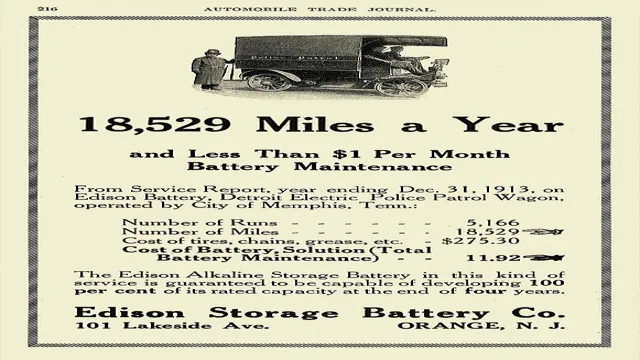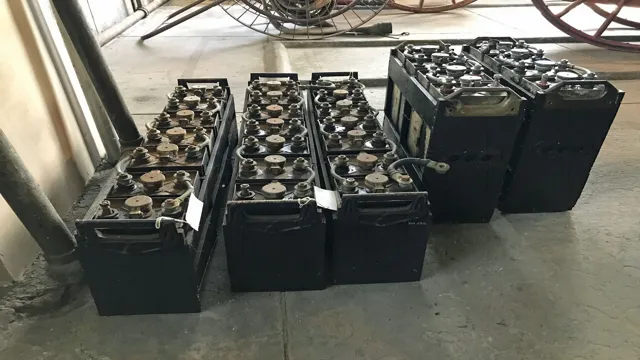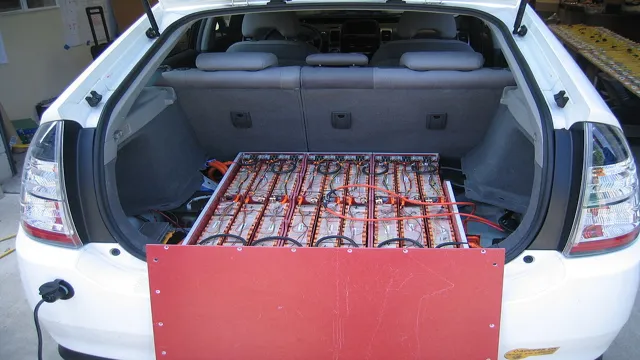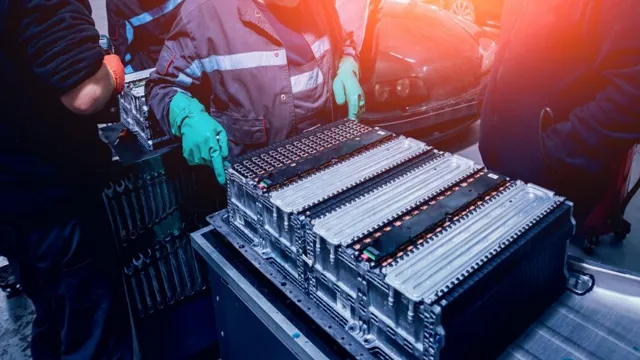Powering the Future: How Edison’s Battery Innovation is Revolutionizing the Electric Car Industry
When you think of Thomas Edison, you may picture him in a lab coat, tinkering away at a light bulb. But did you know that the prolific inventor also made significant contributions to battery technology? That’s right – the same man who illuminated our world also helped power it. Edison’s battery innovations weren’t just a novelty – they had real-world applications.
For example, his alkaline storage battery was used for backup power in telephone central offices and even submarines. He also developed batteries for use in electric vehicles, which was a groundbreaking idea at the time. But what made Edison’s batteries so special? For one thing, they were more durable than previous models.
They could withstand more charge and discharge cycles before needing to be replaced. Additionally, they were cheaper to produce, which made them more accessible to the general public. Of course, like any inventor, Edison had his share of failed experiments.
But one thing’s for sure – his contributions to battery technology paved the way for the advancements we enjoy today.
Edison’s Vision for Electric Cars
Edison’s vision for electric cars was not limited to just creating efficient batteries. He believed that electric vehicles had the potential to revolutionize the automotive industry and bring about a cleaner, more sustainable future. Edison worked tirelessly to create batteries that were reliable and long-lasting, eventually landing on the nickel-iron battery design that powered early electric cars.
His goal was to make electric cars as practical and convenient as gasoline-powered cars, which dominated the market at the time. Edison was also a proponent of renewable energy sources, such as wind and solar power, which could be harnessed to charge electric vehicles. He believed that electric cars would become more affordable as the technology improved, making them accessible to people across all income levels.
Although Edison’s vision for electric cars was ahead of its time, his work laid the foundation for modern electric vehicles and inspired many inventors and scientists to pursue cleaner, more sustainable transportation options.
The Advantages of Electric Cars
Electric Cars Electric cars have been around since the late 1800s, but it wasn’t until the early 1900s that they started to gain popularity. Thomas Edison, the inventor of the light bulb, had a vision for electric cars and believed they were the future of transportation. Today, electric cars have become a viable option for many consumers due to their numerous advantages.
For starters, they are environmentally friendly and emit zero pollutants. This not only helps reduce our carbon footprint but also improves air quality. Additionally, electric cars are much cheaper to operate than traditional gas-powered cars.
They have lower maintenance costs, and electricity is often cheaper than gasoline. Electric cars are also silent and provide a smooth and quiet ride. Above all, they offer a new level of convenience by allowing drivers to charge their vehicles at home overnight instead of having to make frequent trips to the gas station.
With advancements in technology and widespread adoption, Edison’s vision for electric cars has become a reality.

Limitations of Early Batteries
In the early days of the automobile industry, batteries were a major limitation for electric cars. These early batteries were heavy, bulky, and had limited range. However, Thomas Edison had a vision for electric cars that could overcome these limitations.
He believed that electric cars were the future of transportation and envisioned a battery that was lightweight, powerful, and had a large capacity. Edison experimented with different materials and designs for batteries, and eventually developed a nickel-iron battery that was more durable and efficient than the lead-acid batteries that were commonly used at the time. While the technology for these batteries was still in its infancy, Edison’s vision for electric cars helped pave the way for the development of modern electric cars.
Today, we can see the fruits of his labor as electric cars become more popular and accessible to the general public.
The Creation of Nickel-Iron Batteries
It’s no secret that Thomas Edison was one of the greatest inventors of all time, but did you know that he worked on making batteries for electric cars? That’s right! In the early 1900s, Edison was trying to find a solution for powering electric cars. At that time, lead-acid batteries were commonly used but they were not very efficient or long-lasting. Edison wanted to create a battery that was more durable and had a longer lifespan.
He eventually developed the nickel-iron battery which was more powerful and had a life-span of up to 20 years. This battery was perfectly suited for electric cars and was a major breakthrough in the automotive industry. Even after over a century has passed, Edison’s invention still remains relevant in the modern world, and his spirit of innovation continues to inspire those who develop sustainable energy sources for the future.
Nickel-Iron Battery Features
Nickel-Iron Battery Nickel-iron batteries have been around for over a century, initially invented by Thomas Edison. Despite being overshadowed by the lead-acid battery, this type of battery is still used today due to its robustness and longevity. The technology utilizes nickel oxide-hydroxide positive electrodes, iron negative electrodes, and a potassium hydroxide electrolyte.
One of the standout features of a nickel-iron battery is that it has a very long service life, in some cases, up to 30 years. Additionally, nickel-iron batteries have excellent resistance to overcharge, allowing them to operate for extended periods without being damaged. While nickel-iron batteries have a lower energy density than modern lithium-ion batteries, they are considered safer to use and do not pose the same risk of thermal runaway.
This makes nickel-iron batteries an excellent option for use in off-grid storage systems, backup power, and other applications that require long service life and durability.
Applications of Nickel-Iron Batteries
Nickel-iron batteries were invented over a century ago by Thomas Edison, and although they never became as popular as other battery types, they still have their applications today. These batteries are known for their durability and long lifespan, with some being able to last for over 20 years. One of the most significant applications of nickel-iron batteries is in renewable energy storage.
They are capable of storing energy generated by solar panels or wind turbines, allowing for that energy to be used even when the sun isn’t shining or the wind isn’t blowing. Nickel-iron batteries are also commonly used in off-grid living situations. Since they have a long lifespan and require minimal maintenance, they are an excellent option for powering homes that are not connected to the grid.
Additionally, nickel-iron batteries are non-flammable and non-toxic, making them a safer option compared to other battery types. Overall, while nickel-iron batteries may not be as well-known as lithium-ion batteries, they have their unique applications and benefits in various industries.
The Impact of Edison’s Battery on Modern Electric Cars
When we think of electric cars, we often think of sleek and modern vehicles equipped with advanced lithium-ion batteries. However, we should not forget the impact of Edison’s battery in paving the way for modern electric cars. In fact, Edison’s creation of nickel-iron batteries in 1901 helped make electric cars a viable option.
The nickel-iron battery was durable, long-lasting, and could be recharged quickly, making it a great alternative to lead-acid batteries that were commonly used at the time. Edison believed that electric cars were the future, and his nickel-iron battery helped make that future a reality. While lithium-ion batteries have surpassed nickel-iron batteries in today’s electric cars, we owe a debt of gratitude to Edison and his innovative battery technology for laying the foundation for the future of electric transportation.
The Legacy of Edison’s Battery Technologies
Edison was a genius who worked on various battery technologies throughout his lifetime and electric car batteries were no exception. He understood that for electric cars to be widely adopted, they needed a reliable and efficient battery. Edison experimented with nickel-iron batteries, which could withstand extreme temperatures and had a longer lifespan than lead-acid batteries.
However, they were more expensive to produce, and their energy output was not as efficient. Despite that, Edison’s work on these batteries served as a foundation for future developments, and his contributions to the field of energy technology have inspired generations of scientists and engineers. Today, electric car batteries have made a significant advancement, thanks to the efforts of innovators like Edison.
With the advent of technologies such as lithium-ion and solid-state batteries, electric cars have become more practical and affordable than ever before. Despite his battery technologies not being widely used today, Edison’s contributions to science and his legacy have made a lasting impact on the world.
Edison’s Contributions to Energy Storage Science
Edison’s legacy is felt even today, especially in the field of energy storage science. His work on battery technologies revolutionized the way we store and use electricity. Edison’s contributions to the lead-acid battery paved the way for modern battery storage systems like the Lithium-ion battery.
Edison’s batteries were highly innovative for their time, and they helped power everything from homes to the electric carriages of the late 1800s. Even though these batteries had limitations, they marked a significant leap forward in energy storage technology. Edison once said, “I have not failed 10,000 times.
I have successfully found 10,000 ways that will not work.” His perseverance led to many groundbreaking discoveries, including the alkaline battery. His ingenuity and devotion to science and technology have made him one of the most revered inventors of all time, and his contributions to energy storage science have made our modern-day lives possible.
Future Trends in Battery Technologies and Electric Cars
As we move towards a more sustainable future, it’s important to consider the role of battery technologies and electric cars in reducing our carbon footprint. The legacy of Edison’s battery technologies has paved the way for the development of more advanced and efficient batteries used in modern electric vehicles. With the rise of renewable energy sources like wind and solar power, the demand for batteries is only going to increase.
One of the key future trends in battery technologies is the use of solid-state batteries that promise higher energy densities and improved safety. Furthermore, research is being done to develop faster charging methods for electric cars and to make batteries recyclable. All of these advancements will lead to the widespread adoption of electric cars, ultimately resulting in a cleaner and more sustainable environment.
Conclusion: Edison’s Impact on the Electric Vehicle Industry
In retrospect, it’s almost comical to think that Thomas Edison, one of the most famous inventors in history, spent a portion of his career working on batteries for electric cars. While it may seem like a minor pursuit for someone known for inventing the lightbulb and phonograph, Edison was a visionary who recognized the potential of electricity and its role in the transportation industry. It may not have been the most glamorous project, but Edison’s work laid the foundation for future advancements in electric cars and sustainable transportation.
So the next time you plug in your electric vehicle, take a moment to thank the old wizard himself, Thomas Edison, for his contributions to the cause.”
FAQs
Who was Edison?
Thomas Edison was an American inventor and businessman who is famous for developing many devices that greatly influenced life around the world.
What did Edison work on?
Edison worked on developing many devices, including the first practical incandescent light bulb and the phonograph. He also worked on developing batteries for electric cars.
How did Edison contribute to the development of electric cars?
Edison is credited with developing a nickel-iron battery in the early 1900s that was used in electric cars. He hoped that these batteries would eventually replace gasoline-powered engines.
Why did Edison focus on developing batteries for electric cars?
Edison believed that electric cars were the future of transportation and that they would eventually replace gasoline-powered cars. He saw the development of reliable batteries as crucial to making electric cars practical and affordable.






